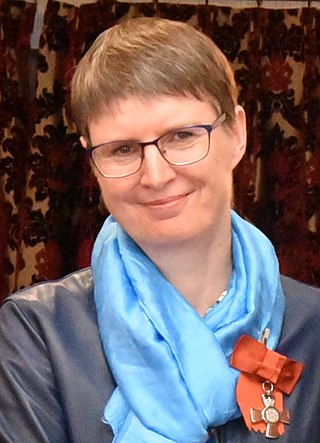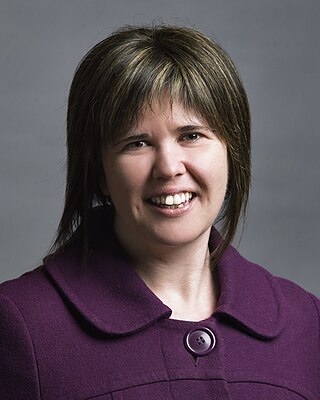
The Rutherford Medal is the most prestigious award offered by the Royal Society of New Zealand, consisting of a medal and prize of $100,000. It is awarded at the request of the New Zealand Government to recognize exceptional contributions to the advancement and promotion of public awareness, knowledge and understanding in addition to eminent research or technological practice by a person or group in any field of science, mathematics, social science, or technology. It is funded by the New Zealand government and awarded annually.

The Royal Society Te Apārangi is a not-for-profit body in New Zealand providing funding and policy advice in the fields of sciences and the humanities. These fundings are provided on behalf of the New Zealand Ministry of Business, Innovation and Employment.
The Hector Medal, formerly known as the Hector Memorial Medal, is a science award given by the Royal Society Te Apārangi in memory of Sir James Hector to researchers working in New Zealand. It is awarded annually in rotation for different sciences – currently there are three: chemical sciences; physical sciences; mathematical and information sciences. It is given to a researcher who "has undertaken work of great scientific or technological merit and has made an outstanding contribution to the advancement of the particular branch of science." It was previously rotated through more fields of science – in 1918 they were: botany, chemistry, ethnology, geology, physics, zoology. For a few years it was awarded biennially – it was not awarded in 2000, 2002 or 2004.

Sir Mason Harold Durie is a New Zealand professor of Māori Studies and research academic at Massey University. He is known for his contributions to Māori health. In 2020, he was appointed to the Order of New Zealand, the highest honour in New Zealand's royal honours system.

Christine Coe Winterbourn is a New Zealand biochemist. She is a professor of pathology at the University of Otago, Christchurch. Her research in the biological chemistry of free radicals earned her the 2011 Rutherford Medal and the Marsden Medal, the top awards from each of New Zealand's two top science bodies.

Vada Harlene Hayne is an American-born academic administrator who was the vice-chancellor and a professor of psychology at the University of Otago in New Zealand, before moving to Western Australia to take up the position of vice-chancellor at Curtin University in April 2021.
Richard Knowles Walter is a New Zealand archaeologist who specialises in the archaeology of the tropical Pacific and New Zealand. His early work focused on East Polynesian colonisation and his PhD tested new models for the colonisation of East Polynesia based on field research he carried out in the Cook Islands. He is best known for his work on the archaeology of Wairau Bar. He did his BA and PhD in anthropology at the University of Auckland with his thesis titled The Southern Cook Islands in Eastern Polynesian prehistory. He then moved to Otago University, where he is currently a professor. He is also an honorary professor at the University of Queensland.
Claudia Geiringer is a New Zealand professor of law. In 2022 she was elected a Fellow of the Royal Society Te Apārangi.

Margaret Anne Tennant is a New Zealand historian, currently Professor Emeritus at Massey University.
Richard Wright Willett was a New Zealand geologist. He rose to be Director of the New Zealand Geological Survey from 1956 to 1967, where his major work was the instigation of a 1:250,000 scale national geological map known as the 'Four Mile project'.

Warren Perry Tate is a New Zealand biochemist and professor of biochemistry at the University of Otago.
Elisabeth Slooten is a New Zealand zoology academic. She is currently a full professor at the University of Otago.

Lisa Matisoo-Smith is a molecular anthropologist and Professor at the University of Otago. As at 2018, she is Head of the Department of Anatomy.
Robert Poulin is an evolutionary ecologist specialising in the ecology of parasitism. He is a professor of zoology at the University of Otago and a Fellow of the Royal Society of New Zealand.
Marsden grants are the main form of contestable funding for fundamental, 'blue skies' research in New Zealand. Grants are made in all areas of research, in both science and the humanities. The grants are made from the Marsden Fund, which was established by the New Zealand Government in 1994. The Fund is administered by the Royal Society of New Zealand. Most of the grants go to researchers at New Zealand universities, but some go to researchers at Crown Research Institutes and elsewhere.

Tracey Kathleen Dorothy McIntosh is a New Zealand sociology and criminology academic. She is of Māori descent and is currently a Professor of Indigenous Studies and Co-Head of Te Wānanga o Waipapa at the University of Auckland.
Marti J. Anderson is an American researcher based in New Zealand. Her ecological statistical works is interdisciplinary, from marine biology and ecology to mathematical and applied statistics. Her core areas of research and expertise are: community ecology, biodiversity, multivariate analysis, resampling methods, experimental designs, and statistical models of species abundances. She is a Distinguished Professor in the New Zealand Institute for Advanced Study at Massey University and also the Director of the New Zealand research and software-development company, PRIMER-e.

Sally Anne Brooker is a New Zealand inorganic chemist. She has been a full professor at the University of Otago since 2006.
Diana Florence Hill is a New Zealand academic, and a full professor at the University of Otago, specialising in molecular genetics. Hill's team's work on the genetics of animal production was awarded a Silver Medal by the Royal Society in 1996. She has been a Fellow of the Royal Society Te Apārangi since 1997.

Angela Cheryl Wanhalla is a professor of history at the University of Otago in New Zealand. Her book about interracial marriage in New Zealand won the 2014 Ernest Scott Prize. Wanhalla was elected as a Fellow of the Royal Society Te Apārangi in 2022.











